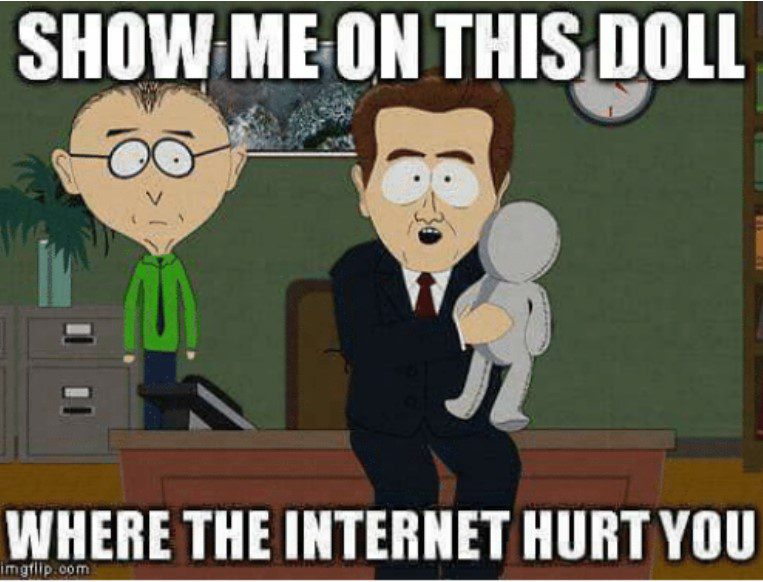
Originally posted in 2020. Updated and corrected.
It’s not hard to find out who I am. Sixty seconds with God — also known as Google — or any of the lesser search engine deities, will reveal everything you would ever want or need to know about Bruce Gerencser. Out of seven billion people on planet Earth, I am the only Bruce Gerencser. Ain’t I special, right? Anyone bothering to exercise a modicum of curiosity will quickly find out that I was part of the Evangelical church for fifty years; that I attended an Independent Fundamentalist Baptist (IFB) college and married the daughter of an IFB preacher; that I pastored Evangelical churches in Ohio, Texas, and Michigan for twenty-five years; that I left the ministry in 2005; that I left Christianity in 2008. Since 2008, I have worn the atheist moniker. I have not hidden who or what I am. Yet, countless Evangelicals who send me emails, contact me on social media, or comment on this blog are clueless about my background and journey from Evangelicalism to atheism. Having about as much curiosity as a smushed raccoon on an Ohio country road, these deliberately uninformed followers of Jesus say all sorts of things to me; absurd things, in light of my past and present unbelief. What follows is a brief Facebook discussion with one such person. (Please see Curiosity, A Missing Evangelical Trait.)
By way of background, the woman who contacted me on Facebook took issue with what I wrote about IFB evangelist and pastor CT Townsend. Townsend is the pastor of Victory Baptist Church in North Augusta, South Carolina. The woman who contacted me is a long-time member of Victory Baptist. You can read what I wrote about Townsend here:
- Emotionally Manipulating IFB Church Members through Music and Preaching Styles
- How Dare I Badmouth IFB Evangelist CT Townsend! Says Fundamentalist Christian
Grammar and spelling corrected
VBC Member: If all you do is sit around talking about what others are or are doing or not doing….I believe you have missed the point of life.
Bruce: Well, it’s a good thing, then, that’s not all I am doing. As if you would know what I am doing since you don’t know me.
You might want to ponder this verse: “He that answereth a matter before he heareth it, it is folly and shame unto him” before sitting in judgment over people you have never met and know nothing about.
Now, let me get back to what I’m doing: photographing a high school basketball game.
VBC Member: But you don’t believe the Bible ? …. yet you quote scripture. I guess it works for when it suits you. So, let me remind you to be mindful of speaking against a man of God. I was just sending you a word to ponder. You are in my prayers.
Bruce: I’m reminding you that you are a hypocrite. As far as “speaking” against a man of God, (I have no idea which preacher you are talking about), preachers aren’t any different from the unwashed, uncircumcised Philistines of the “world.” I was a pastor for 25 years. I know what goes on behind closed doors; where the bodies are buried. Sorry, just because someone is a pastor doesn’t mean they deserve deference/respect. Such things are earned, in my book.
VBC Member: But, are you not doing the same things when you give your opinion of a man of God? In my opinion, if you do not believe in God and denounce him, then why do you care what any man of God does? Does that not make you the same as you say I am being? I read recently one of your blogs. I do not understand how you can speak such nonsense? That is just your opinion on how you perceive someone based on what you have been through. I truly believe that whatever it is that you have experienced while you were a pastor was very hurtful. Perhaps you feel let down by God or, the ministry. I do not believe that you really denounce everything to do with Christ. Because, in my opinion, you would not try so hard to tear down everything you once believed in. I believe when you watch a pastor preach you perhaps feel conviction, because deep down you know the truth they speak. So, the devil is able to discourage you reflect on others what you went through. My heart truly breaks for you. If you no longer want to believe in HIM, then be done with it. That is your choice, but you are trying too hard to attack others who believe in God. The God I am speaking of is the one who died on the cross to save us all. By doing that we were given a choice to accept HIM. God does not force us to believe in Him. I hope you remember no man is perfect but HIM. We are all human and we make mistakes and fail daily. That is why we as Christians need HIM. I was not meaning to attack you or put you down. I knew you would think I was judging you but, that is what you were doing in your blog post when speaking against my friend and pastor. I respectfully say to you, to be mindful in speaking against a man of God in such a way as you did. I am going to be praying for your heart to soften and heal from what hurt you. You have all the head knowledge and truly know the ins and outs of what may or may not be going on in churches. I pray that starting at this very moment as you read this that you are reminded of the goodness and love God has for you. I assure you my pastor/ friend has earned the favor of God and is humbled by what God has done for him and continues to do in his life. The devil wants nothing more than for you to denounce God and put down others who believe as you once did. God is a sovereign Savior. He knows all. My prayer for you is that you remember why you were called and once believed. I am so sorry that you were hurt. Take care and I wish you the best.
Bruce: Who, specifically, are you defending?
VBC Member: When I read your blog I had a different feeling about you. I saw deep hurt. My reaching out to you was not to bash you or disrespect you. My heart hurts for you. I didn’t feel the need to protect my Pastor’s heart or intentions because God knows his, mine, and yours and HE knows our intentions. I can say as a human being there have been times in my life I did not understand GOD myself or his plans concerning my life. So, I get why some people turn their backs on anything to do with GOD. I have had my dark days too. I am not defending my Pastor. I was more so trying to open up and tell you I get it and understand. I do not look down on you at all. I wanted to say, “ I understand and I am sorry. “ ….. we can not try and deflect on others our pain and disappointment. Religious beliefs or not what purpose does that really get us. Maybe, instant gratification but only last for so long.. How we live our life reflects our heart. Dr. R Larry Brown was my Pastor for 39 years. Now we have a wonderful new Pastor C.T. Townsend. I can not change your opinions or beliefs. I can pray for you. Because where others lash out because of your blog. I see a man that was deeply hurt and sad, and angry and bitter at the way things went while you were a pastor. Just maybe you have a right to those feelings and emotions. You are right Sir, I don’t know you. I have experienced hurt and all of the above. Maybe you are right there is no God or the Devil. So, when we die those who believe and are Christians have not lost a thing, but if it is all true how terrible would that be?
You can research a man all day and size them up. Sometimes, you can be right, but who are we to judge? You felt attacked and judged by me and was quick to quote the Bible or say it was not very Christian of me to do so. However, you claim you are an atheist just so you can tear down anything to do with other people’s faith. How are you different? No one is perfect I am certainly not. Let people believe what they want. In the end, we all will see who was right. I wish I could share my story with you but I don’t want to bore you or intrude on your time any longer. Just know this was not an attack on you or your character. I saw deeper than your blog post and felt compelled to reach out. I wish you the very best and hope you find that enter peace between you and God.
[end of Facebook discussion]
Most of what this woman writes I have heard countless times before. I am angry, bitter, or hurt. I am out to attack God and the Christian church. Deep down, I know what preachers such as CT Townsend are saying is the T-R-U-T-H! Gotta throw in Pascal’s Wager too. No email from a Fundamentalist Baptist is complete without them sharing some version of Blaise Pascal’s “what if” argument (even though most letter writers have never heard of Pascal’s Wager).
Instead of giving these comments the Bruce Gerencser Line-by-Line Evisceration Treatment®, I want to address the issues of judging others and whether preachers are exempt from judgment.
First, should Christians, or any of us, for that matter, judge other people? I love how this woman tells me I shouldn’t judge, yet her comments are filled with her judgments of me as a person and my past experiences. As a public figure, I know that people will judge me and write all sorts of things about my life — past and present. All I ask, as I did of this woman, is that people at least make an honest effort to get to know me. At the very least, I ask that they invest some time in reading the posts on the WHY? page and the information found on the ABOUT page. Maybe read Dear Jesus and Why I Hate Jesus too.
As far as the Bible saying we shouldn’t judge others, the Good Book doesn’t actually say that. Please read (Does the Bible Really Say “Thou Shalt Not Judge?”) Besides, even if the Bible DID say THOU SHALT NOT JUDGE as many Evangelicals allege, my experiences both in and outside of Christianity tell me that “Bible-believers” are some of the most judgmental people I know. In fact, many Evangelical preachers are top-shelf judgmental assholes.

Second, I want to address the notion that preachers are exempt from being judged by others. Twice, the woman tells me “to be mindful of speaking against a man of God.” Those of us raised in the Evangelical church know that what this woman writes is actually a passive-aggressive threat that says “God hurts, maims, and kills people who dare to speak against those he has chosen to be preachers. If you don’t stop speaking against CT Townsend, God is going to get you!” Boy, I am scared now! A Christian has sicced her God on me, and if I don’t stop writing against this or that preacher or True Christianity® in general, God is going to strike me dead. Well, here I am, bring it on, Jesus. Surely, even a hardcore Fundamentalist Baptist knows that threatening an atheist with judgment from God is a waste of time. Now, if this woman had threatened me with my wife holding a cast-iron skillet over my head, then I might quake in my boots. But, God; the Christian God; the Evangelical God; the IFB God; this woman’s God? I am not worried in the least. I am far more worried about a deranged Bible-thumper showing up at my house one day and killing me in the name of a dead man named Jesus than I am a mythical deity raining fire and brimstone on my head or afflicting me with Job-like boils and hemorrhoids.
Preachers are made of flesh and blood just like the rest of us. I can’t think of any reason I should defer judgment on their words and works. CT Townsend, in particular, lives a very public life. His actions and beliefs are not beyond scrutiny and judgment. Instead of hurling meaningless warnings of judgment my way, how about considering whether my observations and critiques have merit? As long as preachers such as Townsend say they speak for God and publicly judge and condemn the unwashed, uncircumcised Philistines of the “world” for their way of life, I plan on challenging them. As long as such men continue to demand that their peculiar brand of Christianity be given preferential treatment in the public square, and demand that government at every level follow, obey, and enforce the laws, precepts, and commands of the Bible, I will vociferously object. The day Evangelicals retreat to the privacy of their houses of worship and content themselves with personal piety, then, and only then, will I shutter this blog, having nothing more to say. Of course, that ain’t ever going to happen. The Evangelical goal remains what it has always been: to claim the United States for God. And that, my friend, must never happen. Once Evangelicals and their fellow Mormon and Catholic extremists gain the power of the state, freedoms will be lost and people will die. The unholy mixing of church and state always yields the same fruit, and as long as I am breathing, I plan to be on the battlefield with Roundup in hand, spraying every theocratic weed I see. Theocratic thinking, wherever it is found, is a disease that kills all that it touches. If I love my children and grandchildren and care about what the future holds for them, how can I be silent?
Bruce Gerencser, 68, lives in rural Northwest Ohio with his wife of 47 years. He and his wife have six grown children and sixteen grandchildren. Bruce pastored Evangelical churches for twenty-five years in Ohio, Texas, and Michigan. Bruce left the ministry in 2005, and in 2008 he left Christianity. Bruce is now a humanist and an atheist.
Your comments are welcome and appreciated. All first-time comments are moderated. Please read the commenting rules before commenting.
You can email Bruce via the Contact Form.




